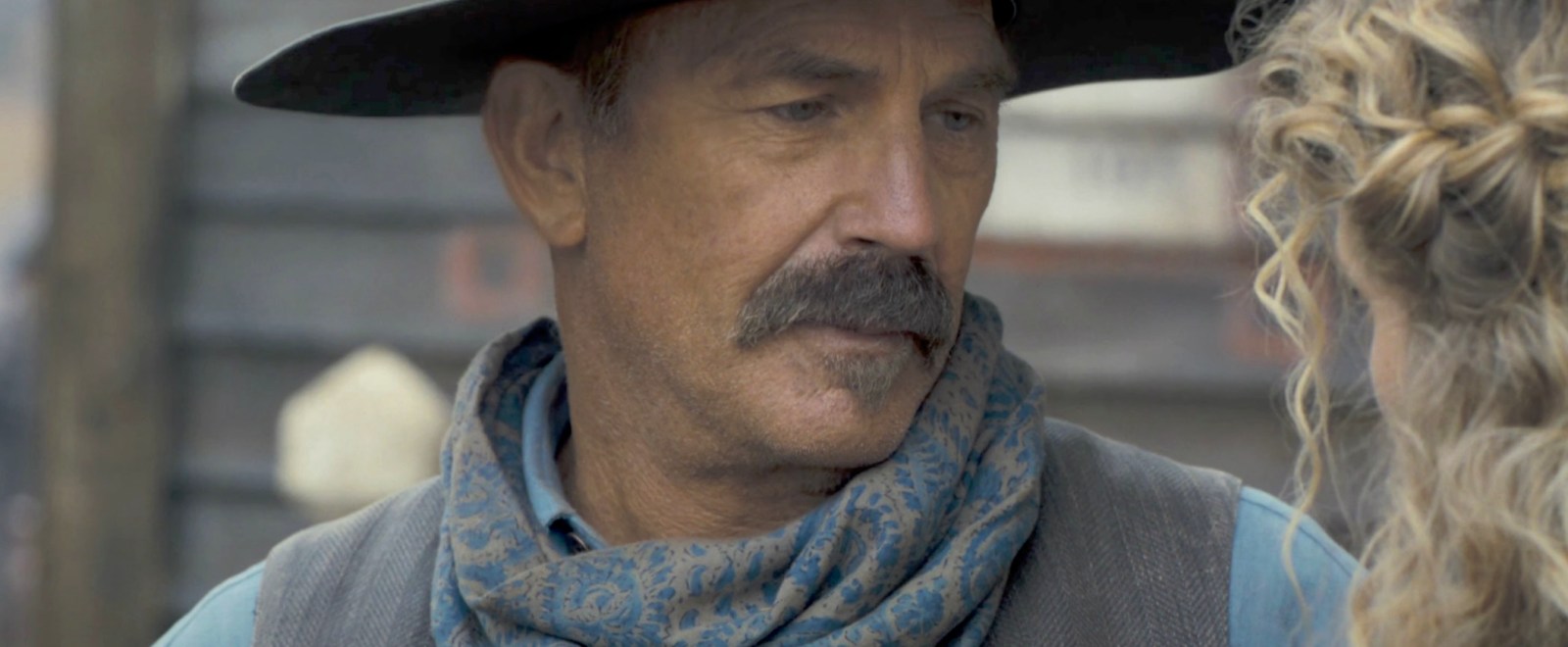
Kevin Costner’s Horizon: An American Saga – Chapter 1 made its Cannes Film Festival debut on Sunday. This is the first of four planned films and first of two completed films in this “saga” from the ex-Yellowstone frontman, and he dropped dozens of millions of his own money into the production. In addition to presenting his return to the director’s saddle, Costner has also used his press time to deliver a long explanation for why he will not appear on Taylor Sheridan’s flagship series again. And how did the film premiere go? Costner received a 7+ minute standing ovation, but critics do not appear to be enthralled with what is being described a three-hour movie that acts as the setup for a much bigger story without much action in and of itself.
In other words, this movie might mostly be for current-era Costner devotees. That’s especially the case since Ryan Lattanzio of Indiewire described the film as though Costner was “trying to out-Taylor Sheridan Taylor Sheridan”:
“Horizon” is shot handsomely with a capital H by J. Michael Muro with the aspect ratio and camera placement of a high-budget television series. Which, along with the movie’s clumsy episodic structure, leads you to believe that Costner may have been trying to out-Taylor Sheridan Taylor Sheridan, the “Yellowstone”showrunner he’s rumored to have drama with as the show supposedly readies for return sans Costner. Costner’s vainglorious efforts in crafting a sincere Western opus he poured much of his own money into are commendable mainly for what he’s put on the line here. But “Horizon” makes even that other $100-million-plus vanity project at Cannes — Francis Ford Coppola’s “Megalopolis” — look like a work of uninhibited genius by comparison.
Vanity Fair‘s Richard Lawson called the film “more like Waterworld than Dances with Wolves” and wasn’t done there:
The strangest, most dismaying thing about the film is that it doesn’t feel like a film at all. Costner, who co-wrote the script with Jon Baird, introduces us to a television season’s worth of characters and plot threads. He jumps from one location to another, much as Game of Thrones did. Yet Costner never lets us feel the grand interconnectedness of these stories. They play as distractions from each other, intruding when something else was maybe, possibly about to find some traction.
Peter Bradshaw of Guardian called out Costner’s “zestless” and age-inappropriate (among other things) writing of his character’s lover-boy ways:
[T]he weirdest and most unconvincing part concerns Kevin Costner’s character: stolid, capable and undemonstrative in the traditional style. This is cool, slow-talking Hayes Ellison , who comes riding into town and immediately gets into most bizarrely unconvincing and zestless onscreen relationship with Marigold (played by 36-year-old Lee; Costner is 69). After Hayes’s violent altercation with Caleb Sykes (Jamie Campbell Bower) this deeply unlikely romantic duo head off together with the child, with weary Hayes apparently not up for sex all that much – but Marigold really finding him very attractive.
Bilge Ebiri of Vulture can’t believe there’s so much more to come:
Addressing the audience at his Cannes premiere, after receiving an extended standing ovation, a clearly emotional Costner yelled, “There’s three more!” Part Two, we know, has already been shot and will be released this fall. Parts Three and Four, it seems, will only be made if audiences come out for Parts One and Two.
Was Costner’s bellow one of triumph or an apology? Maybe a bit of both … Horizon: An American Saga is Dune: Part One for dads (and, hi, I’m dads), and that film also seemed to stop just as it got going.
Robbie Collin of Telegraph, however, believes that this the inception of “granddad cinema”:
with his first feature in 21 years, Kevin Costner may have just invented granddad cinema. Horizon: An American Saga is a western of the breed John Ford made in the 1940s and 50s: earnest, stately and – even in the face of dire odds – humane and hopeful; full of crisply drawn characters and wide landscapes golden with promise, and without a crumb of cynicism in sight.
Hollywood Reporter‘s David Rooney zeroed in on Costner’s treatment of Indigenous characters:
What’s most perplexing coming from Costner is the uncomfortably long time the film takes to show sensitivity toward its Indigenous characters. We’re well into Horizon before the perspective on Native resistance is broadened to acknowledge that their murderous attacks on new settlements are a direct response to the occupation of their ancestral lands. It’s very confusing to see a Western in 2024 and find yourself thinking, “Wait, so American Indians are the bad guys again?”
And Owen Gleiberman of Variety echoed what many elsewhere hinted at — this film simply feels like a miniseries rather than a movie:
“Horizon,” simply put, doesn’t feel like a movie. It feels like the seedbed for a miniseries. Much of what happens is wispy and not very forceful; the film doesn’t build in impact, and it seldom seems to aim in a clear direction. Costner, as an actor, doesn’t show up until an hour in, and when he does, playing a gruff horse trader who’s more than a horse trader, one feels the grounding so much of the film lacks. What you realize, after a while, is that “Horizon” isn’t just a glorified TV series made with more expensively gritty production values. It’s the setup for a TV series. It’s the early stuff we need to know before the drama totally kicks in.
Horizon‘s first two chapters arrive in theaters on June 28 and August 16.
